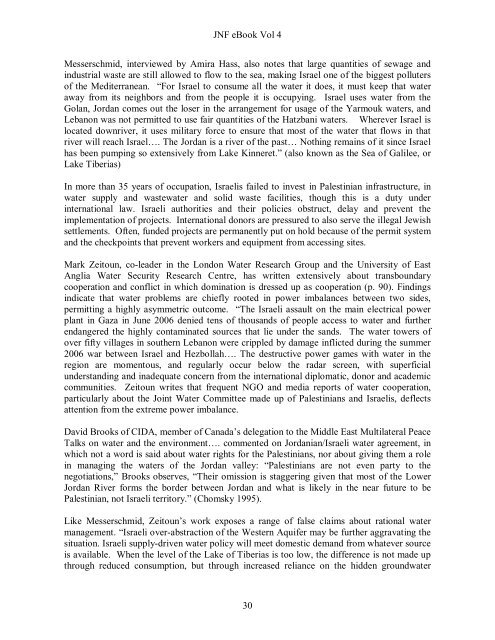JNF eBook Vol 4 - JNF eBook Series
JNF eBook Vol 4 - JNF eBook Series
JNF eBook Vol 4 - JNF eBook Series
You also want an ePaper? Increase the reach of your titles
YUMPU automatically turns print PDFs into web optimized ePapers that Google loves.
<strong>JNF</strong> <strong>eBook</strong> <strong>Vol</strong> 4<br />
Messerschmid, interviewed by Amira Hass, also notes that large quantities of sewage and<br />
industrial waste are still allowed to flow to the sea, making Israel one of the biggest polluters<br />
of the Mediterranean. “For Israel to consume all the water it does, it must keep that water<br />
away from its neighbors and from the people it is occupying. Israel uses water from the<br />
Golan, Jordan comes out the loser in the arrangement for usage of the Yarmouk waters, and<br />
Lebanon was not permitted to use fair quantities of the Hatzbani waters. Wherever Israel is<br />
located downriver, it uses military force to ensure that most of the water that flows in that<br />
river will reach Israel…. The Jordan is a river of the past… Nothing remains of it since Israel<br />
has been pumping so extensively from Lake Kinneret.” (also known as the Sea of Galilee, or<br />
Lake Tiberias)<br />
In more than 35 years of occupation, Israelis failed to invest in Palestinian infrastructure, in<br />
water supply and wastewater and solid waste facilities, though this is a duty under<br />
international law. Israeli authorities and their policies obstruct, delay and prevent the<br />
implementation of projects. International donors are pressured to also serve the illegal Jewish<br />
settlements. Often, funded projects are permanently put on hold because of the permit system<br />
and the checkpoints that prevent workers and equipment from accessing sites.<br />
Mark Zeitoun, co-leader in the London Water Research Group and the University of East<br />
Anglia Water Security Research Centre, has written extensively about transboundary<br />
cooperation and conflict in which domination is dressed up as cooperation (p. 90). Findings<br />
indicate that water problems are chiefly rooted in power imbalances between two sides,<br />
permitting a highly asymmetric outcome. “The Israeli assault on the main electrical power<br />
plant in Gaza in June 2006 denied tens of thousands of people access to water and further<br />
endangered the highly contaminated sources that lie under the sands. The water towers of<br />
over fifty villages in southern Lebanon were crippled by damage inflicted during the summer<br />
2006 war between Israel and Hezbollah…. The destructive power games with water in the<br />
region are momentous, and regularly occur below the radar screen, with superficial<br />
understanding and inadequate concern from the international diplomatic, donor and academic<br />
communities. Zeitoun writes that frequent NGO and media reports of water cooperation,<br />
particularly about the Joint Water Committee made up of Palestinians and Israelis, deflects<br />
attention from the extreme power imbalance.<br />
David Brooks of CIDA, member of Canada’s delegation to the Middle East Multilateral Peace<br />
Talks on water and the environment…. commented on Jordanian/Israeli water agreement, in<br />
which not a word is said about water rights for the Palestinians, nor about giving them a role<br />
in managing the waters of the Jordan valley: “Palestinians are not even party to the<br />
negotiations,” Brooks observes, “Their omission is staggering given that most of the Lower<br />
Jordan River forms the border between Jordan and what is likely in the near future to be<br />
Palestinian, not Israeli territory.” (Chomsky 1995).<br />
Like Messerschmid, Zeitoun’s work exposes a range of false claims about rational water<br />
management. “Israeli over-abstraction of the Western Aquifer may be further aggravating the<br />
situation. Israeli supply-driven water policy will meet domestic demand from whatever source<br />
is available. When the level of the Lake of Tiberias is too low, the difference is not made up<br />
through reduced consumption, but through increased reliance on the hidden groundwater<br />
30


